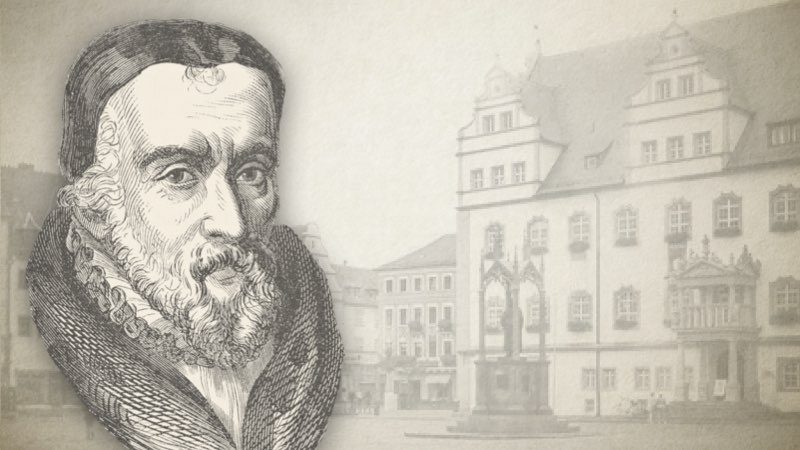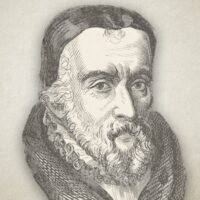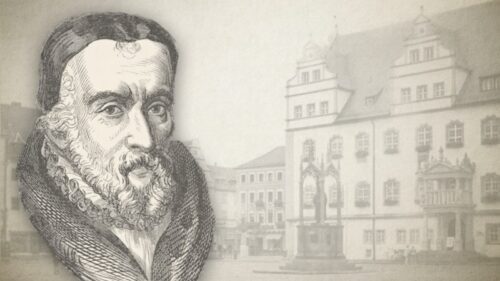
The Life And Martyrdom Of William Tyndale
The Sower 1880:
There is no history in the world so replete with heroes and heroic actions as the history of England. Our national records, present one continuous portrait gallery, hung with the most brilliant galaxy of noble and patriotic characters. These heroes may be divided into two classes—the world’s heroes, and God’s heroes. In the former class, we include those who have gained human esteem and favour, such as the military hero, who has earned his fame at the cannon’s mouth; or the philanthropic hero, who, at great personal sacrifice, it may be, strives to ameliorate the condition of a part of the human race; or the political hero, who, at some crisis in our history, has skilfully guided our nation’s helm. These men have gained the world’s plaudits, are loaded with worldly dignities, and become the idols of the people. But with the second class—God’s heroes—it is very different. Being taught and emboldened by the Holy Spirit, and having their affections set on things above, they take the path of ignominy and reproach. Despising all human favour and worldly emolument, these heroes “choose rather to suffer affliction with the people of God, than enjoy the pleasures of sin for a season.” Such an hero was William Tyndale. His life-work was the translation of the Holy Scriptures into the people’s tongue, and their diffusion throughout the length and breadth of the land. A more unpopular work Tyndale could not have undertaken. He met opposition on all sides; his cruel and crafty foes encountered him at every step, and tried to move him from his purpose by all the means and wiles they could summon to their aid. He was hunted from town to town like a criminal, and was subsequently burnt at the stake, because he had dared to give to his fellow-countrymen the Bible in their own language. Such an interesting career, displaying such a combination of rare and noble qualities, and evincing such a vigorous determination to accomplish one of the grandest works man has ever effected, is the subject of this paper.
William Tyndale was born in Gloucestershire, and at an early age was sent to Oxford, where he became a very proficient Greek scholar. He was a young man, as Fox tells us, “of most virtuous disposition, and life unspotted,” and the perusal of the Greek New Testament of Erasmus was the means, under the influence of the Holy Spirit, of opening the eyes of Tyndale to see his lost and ruined condition by nature, and his need of such a Saviour and such a finished salvation as the Gospel proclaims. The young student soon attracted notice by the delivery of lectures on the Gospels, and this so exasperated the Papists that he was compelled to quit the banks of the Isis, so he repaired to Cambridge, where he met with many—Bilney, Fryth, and others—who, like himself, had tasted of the sweets of the Gospel of Christ. Having completed his University studies, he returned to his native county, and became tutor in the family of Sir John Walsh, of Sodbury Hall. Here Tyndale was often engaged in long and animated discussions with the clergy and gentry of the neighbourhood on various subjects that were then receiving public attention. Religious matters were often the occasion of very hot debates, as Tyndale did not hesitate to avow his sympathy with Luther and the reforms he had commenced in Germany, and he also ably and vigorously defended the right of the laity to the Scriptures. This greatly incensed the clergy, who raised the cry of “heresy,” and violently declaimed against Tyndale from their pulpits. A secret accusation was laid against him before the bishop’s chancellor, but Tyndale defended himself so admirably that he escaped out of the hands of his enemies. He now began to explain the Scriptures on Sundays to Sir John Walsh and his tenantry; then he extended his labours to the neighouring villages, and ultimately to Bristol. But no sooner had he sowed the precious seed of the Gospel, than the priests hastened to destroy it, and when Tyndale observed this, he said, “Oh, if the people or England had the Word or God in their own language, this would not happen. Without this it will be impossible to establish the truth.” It was now the sublime idea entered his mind of translating and printing the Scriptures. “If God spare my life,” said Tyndale, “I will, before many years have passed, cause the boy that driveth the plough to know more of the Scriptures than the priests do.”
The hostility of the priests, however, was too keenly excited for him to be able to prosecute his grand work in Gloucester- shire, so he resolved to go to London, hoping to gain admission to the household of Tunstal, bishop of the metropolis, whose learning Erasmus had highly eulogized. He obtained an audience of the prelate, but only to be disappointed, for Tunstal gave him no encouragement. But a wealthy London merchant, who had heard Tyndale preach in the metropolis, opened his door and gave him a cordial reception. Here Tyndale vigorously proceeded with his work. Living very abstemiously at a table loaded with delicacies, he studied night and day; and, being very eager of finishing his work with the utmost celerity, he summoned Fryth to his aid. The two scholars had been engaged about six months in their work, when a storm of persecution breaking out in London suddenly interrupted them. Rigorous search was made for all who possessed any of Luther’s works. Tyndale saw his danger, and was compelled to leave the country with a heavy heart, but determined resolution. He sailed for Germany, and, arriving at Hamburg, he unpacked his manuscripts and again set to work. Here William Roye became his assistant; and in 1524 the Gospels of Matthew and Mark were translated and printed, and sent across to Monmouth, the London merchant who had so hospitably entertained Tyndale, as the first-fruits of his labours. The merchant sent him a supply of money, which enabled Tyndale to visit Luther at Wittenberg, and from there he went to Cologne and established himself at the printing house of Quentet and Byrckmars, where he began to print an edition of three thousand copies of the New Testament in the English tongue. Great was Tyndale’s joy as sheet after sheet was passing through the press, but, though every precaution had been taken to prevent discovery, the work was abruptly stopped. The Senate had ordered the printing of the Testament to cease, so Tyndale was again hindered, but his determination to accomplish the great task was too persevering to be thus baffled. Bidding his assistant follow him, he packed up the printed sheets and proceeded to Worms. Here the work of printing was speedily resumed at the house of Peter Schoefer, and two editions were completed by the end of 1525, and soon thereafter 1,500 copies were dispatched to England. The arrival of these New Testaments in our country was a marked event in our historic annals. Strenuous efforts on the part of the priests were made to stay their circulation; all the vessels arriving at the various ports were rigorously searched; edicts were promulgated against all persons who dared to read these “heretical” works; and, in short, no stone was left unturned to impede the progress of the Gospel in our land. Notwithstanding all the edicts, all the scrutiny, and all the Bible- burnings, the Word of God found its way into the most remote parts of the country, and was assiduously studied by many thousands of our forefathers. Edition after edition was printed and arrived in England, which so exasperated the authorities of the Church of Rome that they determined to arrest Tyndale. He was hunted from town to town like a criminal, and he ultimately settled at Antwerp, where he was captured and imprisoned more than a year and a half in the strong castle of Vilvorde; and on October 6th, 1536, after uttering this short prayer, “Lord, open the King of England’s eyes,” he was strangled at the stake, and his lifeless body consumed in the flames.
Amongst the many noble deeds Englishmen have achieved, or the many daring exploits and heroic actions in which our countrymen have participated, we unhesitatingly place Tyndale’s life-work—the translation and circulation of the New Testament—above them all. The valiant martyr bequeathed a rich legacy to his countrymen, and so long as true Bible readers and genuine lovers of Gospel truth are found in these realms, there will be some who will be ever ready to thank God for raising up such an indefatigable and uncompromising champion for the truth as William Tyndale.—J. C.
William Tyndale (1494-1536) was a sovereign grace preacher during the Protestant Reformation, a biblical scholar and linguist. He is best known for translating the Greek New Testament into English and overseeing its printing, publication and distribution. His work became the foundation for subsequent translations, such as the Coverdale Bible (1535), Matthew’s Bible (1537), Great Bible (1539), Bishop’s Bible (1568), Geneva Bible (1560) and the Authorized Version (1611). It is estimated the King James Translation retains 80% of Tyndale’s work.




